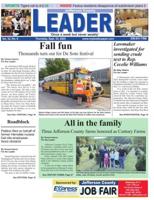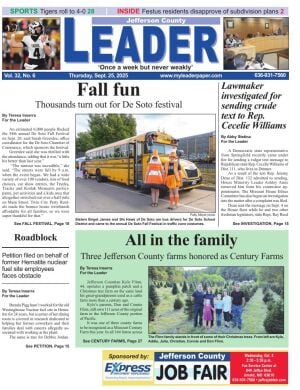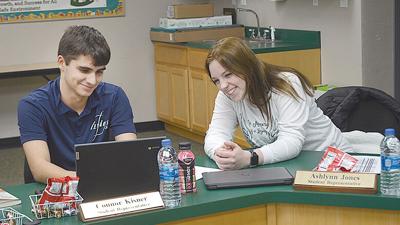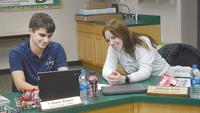The De Soto Board of Education is seeking advice from the young.
Since November, the board has included a pair of high school juniors, Ashlynn Jones and Connor Kisner, as student representatives.
The two do not vote, but they sit with board members and administrators at regular meetings.
“They’re asked to give an update at every meeting,” Superintendent Josh Isaacson said. “At times, board members ask them about what they think, and they’re able to give feedback. I think that’s valuable information.”
The two will serve through the October meeting next school year, when a new pair of juniors will join the board.
Isaacson said the idea of having student advisers originated a few years ago.
“Our board members went to an MSBA (Missouri School Boards Association) conference and learned about school boards that had student advisers. They came back and said, ‘Do you think this is something that we can do?’ So really, this was started by the school board.”
However, during the COVID-19 pandemic, the idea was scrapped, then was revived for the current school year.
Isaacson said Jones and Kisner have provided a different perspective.
“Students are our clients. We want to provide multiple avenues so they can insert their voices. I’ve found that (Connor and Ashlynn) are very articulate and spot-on on their assessment of things. They are extremely professional in the way they approach their roles, and I think this experience will be a benefit to them as they move on from our school district.”
Jones, 17, the daughter of Tara Harper, said she was surprised to learn she was selected after she was asked to apply and complete a short essay.
“It was definitely a shock,” she said. “I told my adviser that I needed to get some pants suits and get myself ready for this new opportunity.”
Kisner, 16, the son of Mike and Sara Kisner, said a teacher gave him the application.
“I was thinking about it, whether I wanted to do it or not, but I figured I would go for it. I did the essay, turned it in and a little later I was called into the office and was told I got it,” he said. “In my essay, I talked about being able to represent the school at board meetings, and that the students would want somebody to speak for them. Although I didn’t necessarily know at the time how to go about it, I figured I could help them.”
Jones said because she and Kisner were pioneers of sorts, they didn’t know what to expect.
“I went in there with an open mind. I’m new to this, but everybody was new to this,” she said. “I thought it was interesting learning what students go through in school from the perspective of adults. I think the main thing is to serve as a go-between for students and the board, to explain to the students what’s going on and why.”
She said while most of her fellow students don’t necessarily know about the role she and Kisner serve with the school board, the word is getting around.
“Early on, I had a couple of students come up to Kisner and me and ask about whether the school buildings would be cleaned for students after the flu went around. We brought that to the board’s attention, and they told us, ‘Yes, the schools would be cleaned,’” she said. “A few of the students have asked me those kinds of things.”
Both Jones and Kisner said they were a bit overwhelmed by the atmosphere at board meetings at first.
“It’s a little intimidating at first, being at a meeting with all these very important people, but I think I’ve been able to come up with responses that sound good,” Kisner said. “And I think really, we’re all in the same boat because we want what’s best for the school. And I didn’t realize how much a school board member has to work and what they need to know.”
Jones said she’s learned a lot about how the school district operates.
“The board members are always willing to put their two cents in, which is good. I think the most interesting part has been working with that group of people, whom I believe are trying their best to do the best they can for the students. I have a lot of respect for them. They have to know a lot about a lot of things – education issues, school finance, testing, the various laws. It’s hard to deal with all that. I can’t imagine how much work they put in outside of going to the meetings.”
Kisner agreed.
“It’s a lot of work to understand everything that they’re talking about, but I’ve enjoyed the quarterly updates, and they’ve talked about test scores at some of the recent meetings. I’ve been able to see the scores the teachers always talk about.”
Jones agreed she’s learned a lot about testing over the past few months.
“Seeing all the test scores and how the district does was an eye-opener,” she said. “We have so many students who excel, but seeing those scores, I can see where if the students and staff are able to put forth a little more effort, we can be an exceptional school district with exceptional scores.”
Both students said they thought their experience on the board would look good on a resume or college application.
“I think this is an important leadership position, so I think it would be an important thing for colleges to consider, or for employers to look at when I look for a job,” Kisner said.
He said after graduation, he plans to study agricultural engineering.
“I grew up on a farm, and I think it would be interesting to see the engineering side of farming,” he said.
Kisner said he would entertain the idea of running for a school board seat later in life.
“If I had children in the district – any district that I might live in – I would consider it,” he said. “I think I would recommend it to anybody who wants to understand how a school district operates and how things get done.”
Jones has her sights set on working for the FBI.
“I’d like to solve murders and do investigative work, maybe in forensic science. I like the idea of figuring out what somebody else couldn’t. ‘Criminal Minds’ (TV show) just grew on me,” she said.
Jones said she’s not sure she could coordinate that career with a school board seat.
“I think if I end up working in the field as I’d like to, it would be a pretty demanding job,” she said. “I might be out in Quantico (Va., FBI) headquarters on the night of a board meeting. I wouldn’t rule it (running for a school board seat) out, though. What I can say is I’m never going to forget about this experience.”
Isaacson praised both of the board’s student advisers.
“Both of them are really involved, not just being good students, but on the Student Council, in athletics, all sorts of things. (Jones has been on the basketball, softball, track and soccer teams and has been a football cheerleader; Kisner is a member of the National Honor Society, Student Council and plays soccer.)
“They are very good representatives of all the great students we have at school, and they take their role very seriously,” Isaacson said. “They do a good job of knowing the information that’s included in our board packet. We’re lucky to have them. It’s a lot to ask of a 16-year-old or a 17-year-old, to give up their time once a month to go to a meeting. We’re very appreciative that they’re willing to do it.”
Before his term expires, Kisner said he wants to tackle at least one issue with the board.
“One thing I’d like to bring to their attention is the part of the dress code that says we can’t wear hats in school,” he said. “A lot of the students have told me they’d like to wear hats. I think I’d like to sit down with Dr. Isaacson and the principals and find out whether it could be changed. When we have Hat Day, more than half of the students wear one. I think especially in a rural area like De Soto, hats are a way for students to express themselves.
“But if they explained the reason to not allow them to me, that would be information that I could bring back to the students and that would be valuable communication, no matter how it went. That’s what we’re here for – to bring better communication between the school and the students.”




